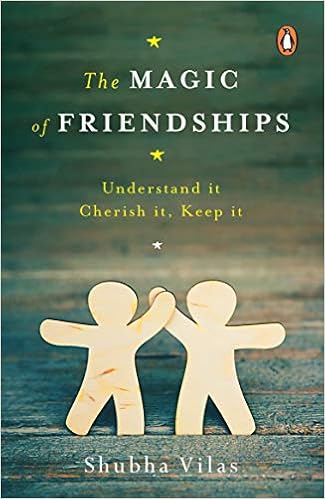28th Book of 2020!
When I turned towards spirituality few years back, the monks who are part of Iskcon foundation intrigued me a lot and I wanted to know so much about them. This made me search for few of them who have turned writers too. One of them is Shubha Vilas and at that point of time, he had written his first book in the Ramayan series and I had liked it a lot. I also read another non-fictional book written by him namely “Open-Eyed Meditations” which also helped me understand certain concepts I wasn’t aware of. So, I was waiting for him to release another new book and I am glad that he did which I have just finished reading. It’s another non-fictional attempt – “The Magic of Friendships”. The book is of around 204 pages published by Penguin books.
The writing style of Shubha Vilas is very simple which makes it easy even for a reader of 12 years of age or someone who has not been into convent schooling. His purpose of spreading his knowledge and perception about Friendship to as many people as possible becomes certain with the slow narration that he has used in defining each and every point. He doesn’t hurry with chapters and concepts and give ample of time to each of them to ensure that the readers grasp them completely.
There is nothing spiritual or deep in this book in case you are scared that after picking this book up, you shall not be able to relate with it. The chapters speak about Friendship as a concept and how it can be a boon to our life and lifestyle. Author speaks in brief about how friends can become catalyst in our life and can make it both – Good from Bad or Bad from Good considering the kind of company you have. Author doesn’t shy away from giving multiple examples- some real stories – some Vedic and Epic stories while some made-up stories to ensure that we get the understanding right rather than assuming few things by ourselves. Some of these short stories of 1-3 pages touch you seriously.
Author rather than pointing only at your friends regarding how grateful or back-stabbing they are – tends to highlight that we should focus in improving ourselves in the relationship first before expecting or judging our friends. One thing I am glad about is that author doesn’t end up giving traditional ideas about the same as I was little worried considering his monk background that he might be too harsh on our generation but he wasn’t. Haha!
Book covers some great insights in seven different chapters that talks about how joyful friendship should be, judging yourself as a friend, the power of empathy and the magic it can bring with itself, how friendship shouldn’t be treated as competition between you and your friends but how you can help each other grow together, how peer pressure and self-esteem issues can be handled with good friends around us and about how Friendship can be developed not only with your typical friends but with other relationships in your life too.
The book shall be very impactful for the new generation who are still in their educational or early-job phase as they have still not seen much world and some of them keep on wasting time on friendships without it being of any value of the same to their life. In fact, sometimes, it only causes destruction for them. This book shall really open their eyes regarding how fruitful and productive this relationship can be. For the people who have matured up – for them, the fictional short stories shall be enjoyable as they have some great tales to tell with which you can relate. I could relate with lots of them.
Now talking about the drawbacks of the book – I felt that author didn’t explore many more dimensions which could have been used in this book considering its topic. Author could have talked about how physically meeting friends rather than having video and textual interactions through their smartphones is more recommended. Author should have talked about how to isolate yourself from “Friends” with whom you want to end your friendship after knowing about their bad attitude without causing much damage to your life. It should have also covered how to approach friendship when you are about to convert it into a romantic relationship considering the sensitive topic that it is. And how to face rejection and still keep the friendship going strong. Similarly, the role of spouse and sibling as friends in your life is completely left out from the scope of the book. How to say “No” in Friendship and also to accept the same could have also been covered. Also how to handle friendship when you have patched up after a very big issue between you and your friend.
Except the few points above, I feel that the book is a great teacher for the people who are yet to mature in this concept called friendship and feel that they always get back-stabbed or are unable to carry their friends for long. I give this book 3.25* out of 5.
Thanks.
WRITING BUDDHA










.JPG)
